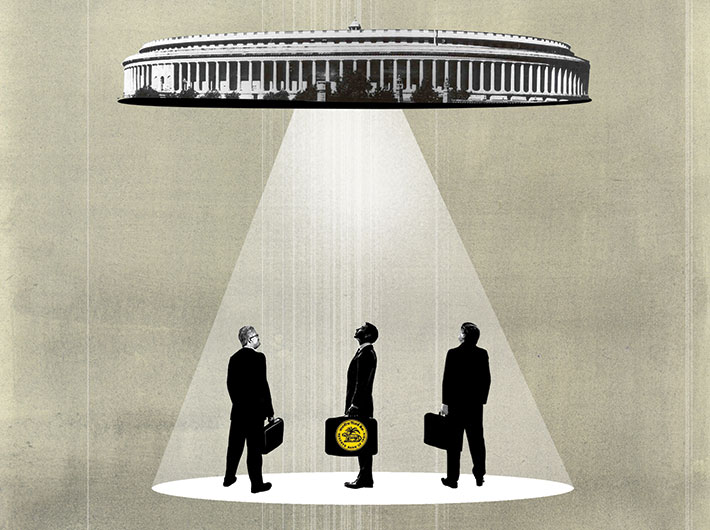Amid the debate surrounding greater autonomy of regulators, it's time we considered fixing their accountability
In September 2013, a committee headed by M Damodaran, a retired IAS officer and former chief of the SEBI and IDBI, submitted a report that raised an issue, long-standing and yet pertinent. Do the regulators need to be regulated, it asked, among several questions it raised.
Going by the nomenclature – set up by the ministry of corporate affairs in August 2012, it was named the “committee for reforming the regulatory environment for doing business in India”– the answer was not difficult to guess. Yes, it said. And nothing less than “direct accountability” of regulatory bodies to parliament would do, it added.
In addition, the committee also proposed to make selection and decision processes of regulatory agencies, which have come to play a bigger role in acting as watchdogs as the economy expands, more transparent. It recommended review meetings of regulators with a parliamentary standing committee every six months.
The Damodaran committee might not have set the cat among the pigeons with its proposals but accountability of the regulators has certainly begun to tickle more people over time – both in the system and outside it. This is alongside arguments over providing regulators enough freedom to operate in an uninhibited and unbiased manner.
Given that certain regulators have more regulatory freedom than others, there has been a void in fixing proper accountability of these agencies. Many former regulators and experts believe accountability through the line ministry is not good enough.
Former RBI governor D Subbarao told Governance Now that making the central bank directly accountable to parliament is important. In fact, prior to his retirement in September last year, he had said that while the RBI Act does not lay down any formal framework to ensure accountability, it does follow “certain good practices (which) have evolved over the years”.
Subbarao’s list of good practices included explaining the monetary policy rationale, post-policy conferences for media interaction, and appearing before the parliamentary standing committee on finance, among others. But he maintained that these weren’t enough to ensure complete accountability.
“As much as I believe that accountability to parliament is a good idea to secure the RBI from pressures from the political executive, the institutional mechanism we build for parliamentary accountability is equally important,” Subbarao said in an email response. “In particular, we should guard against the risk that the RBI is freed from meddling by the government but in the process becomes vulnerable to meddling by MPs,” he said, adding that India could look at practices established by the US Federal Reserve and the Bank of England (where the governor goes before a parliamentary committee) which are tested models.
Besides the Damodaran committee’s recommendation for direct accountability of regulatory bodies to parliament, a draft regulatory reform bill, though limited to the infrastructure sector regulators, suggested similar reforms. While the draft bill has been approved though yet to come up for discussion in parliament, the Damodaran committee report hasn’t elicited much response.
However, with more and more regulators, including the retired ones, joining Subbarao and Chakrabarty in demanding not just more autonomy but also accountability, there is a good chance that the Damodaran committee recommendations and the draft regulatory reform bill may be formalised.
Is accountability absent?
Stressing that regulators’ accountability is almost absent, Vinay Kumar Mittal, a power sector expert and also research coordinator of the Aam Aadmi Party, said: “Regulator accountability is seen only when their orders/directives are challenged in court. Let us not lose sight of the fact that all regulators are appointed through a process where the government has the major say and in general, only the government’s favoured and pliable bureaucrats make it to the regulators’ positions. To expect such people to do justice to regulatory functions is unthinkable.”
Citing the comments of the parliamentary standing committee on energy regarding the central electricity regulatory commission (CERC) in August 2012, calling regulatory commissions the “refuge for superannuated but influential officials”, Mittal termed the accountability situation in the country as pathetic.
The parliamentary committee had noted that regulators’ “primary objective is to remain in employment rather than making any meaningful contribution with regard to the activities of the (regulatory) commissions in the pursuit of their objectives. Hence these bodies have lost sheen and the authority, which they were designed to represent. In the process they have also lost the autonomy, which the Act has provided them for functional purposes. Had these Commissions acted as mandated under the Act, there would have been hardly any justification for languishing electricity sector in the Country.”
Mittal said simply mandating review meetings with parliamentary standing committees is not enough and that focus must also be on implementing their recommendations. “The very fact that regulators like CERC are also holding meetings with the parliamentary standing committee on energy at least once during the currency of every parliament and yet nothing has changed is a signal that an oversight mechanism to ensure implementation of the committee’s recommendations.”
Extrapolating the problem of lack of proper accountability to all the regulators functioning in the country, Udai S Mehta, director, Consumer Unity and Trust Society (CUTS), says that independence (read autonomy) and accountability are not mutually exclusive. “Along with independence, all regulators need to be accountable and appropriate mechanisms are required for this.”
According to Mehta, while regulatory bodies in India are required to submit their annual reports and/or audited accounts to the legislature, most of the times they are made accountable to the legislature through the line ministry.
“Legislative oversight over the regulator’s performance does not seem to be effective as annual reports submitted by regulators are hardly discussed with any seriousness. The regulator’s actions are questioned only when there is an impending crisis or a serious debate in the country. In fact, in most cases it is the line ministry that is questioned, and not the regulator. All this enables the line ministry to interfere in the functioning of the regulatory body and results in weakness in regulatory oversight,” he said.
Pitching in for parliamentary supervision of regulators, Mehta said such a step can limit the scope for line ministries to meddle in the affairs of the regulators.
Mehta also suggests that during the appointment of regulatory body chiefs, the recommendations of a selection committee should be submitted to the parliamentary standing committee, as is done in the US and the UK. “The standing committee may then forward its list of preferred candidates to the government for final selection. Such a mechanism will ensure transparency as well as accountability to parliament,” he argues. With regulators having to depend on the political bosses of the day for fund approvals, these measures would also bring in greater financial autonomy, Mehta adds.
Former TRAI chairman [and now principal secretary to the prime minister] Nripendra Misra, who in principle agrees with the idea of fixing direct accountability of regulatory bodies to parliament, says there would always exist an “unavoidable link” between regulators and line ministries.
“Regular meetings with a parliamentary standing committee is a good idea if they are able to oversee the overall functioning of regulatory bodies in order to mentor them. However, it will be too cumbersome for them to look after each and every functional aspect and that the involvement of line ministries to that extent will be required.”
There exists a group, however, which finds the interference-by-ministries argument “somewhat exaggerated”. Founding chairman of competition commission of India (CCI) Vinod Dhall is one of them. “There is accountability of regulators and one can’t claim that they are not answerable to anyone. For instance, in case of the competition watchdog (CCI), the cases are subject to review at the competition appellate tribunal (COMPAT), which can be further reviewed in appeal by the supreme court. Hence, the CCI cannot take random decisions and still get away with it,” he explains.
On broader issues, Dhall argues that questions continue to be raised in parliament. “In addition on financial issues, audit is conducted by the comptroller and auditor general (CAG). Hence, there are different kinds of measures in relation to different aspects of functioning to ensure accountability.”
Asked about the idea of regulators meeting the parliamentary standing committee, Dhall replied, “It is not clear how this is intended to function. Such meetings do take place during amendment bills, and budget reviews. At a broader level, performance review also takes place during such meetings. However, such meetings may not serve the purpose of regular performance review in a professional manner given that these committees are already flooded with a lot of legislative work including several pending bills.”
Instead, Dhall suggests that it should be made mandatory for regulators to submit an impact assessment report along with their annual reports. “This report should go on to explain and analyse the impact of the actions and decisions taken by the regulator. This can then be compared to the broad benchmarks that can be set by line ministries,” he added.
For Shinjini Kumar, executive director, tax and regulatory services, at PricewaterhouseCoopers, accountability works best within the framework of agreed upon goals and autonomy, instead of a reporting structure. She said, “A common problem we face is that MPs believe that they are only accountable to an amorphous entity called ‘people’ and therefore justify anything as long as people vote for them. So, while accountability to people sounds like the ultimate goal, it can be practically challenging. Transparency is an important way of ensuring accountability as it ensures that outcomes are discussed and course correction is done.”
There will be many more agreements and disagreements. But one thing is for sure: ensuring autonomy and accountability of regulatory institutions cannot be treated in isolation; they are two sides of the same coin. The debate on autonomy has been going on for a while. Though late, it is good that we have started looking at the flipside of the coin.

